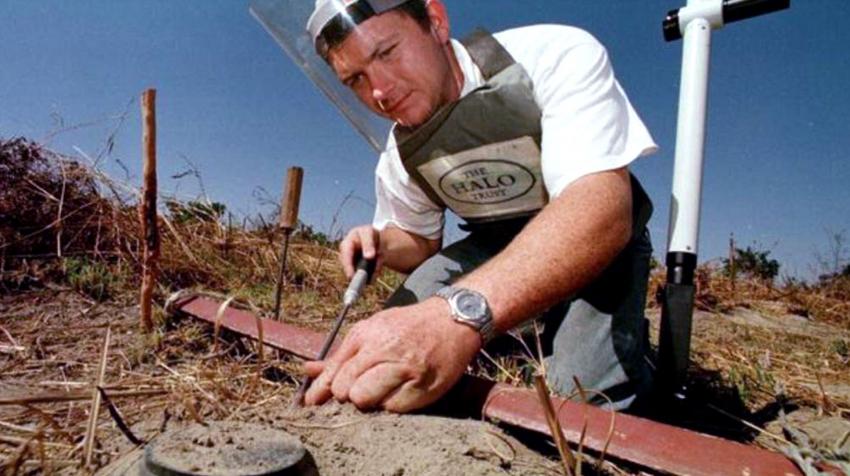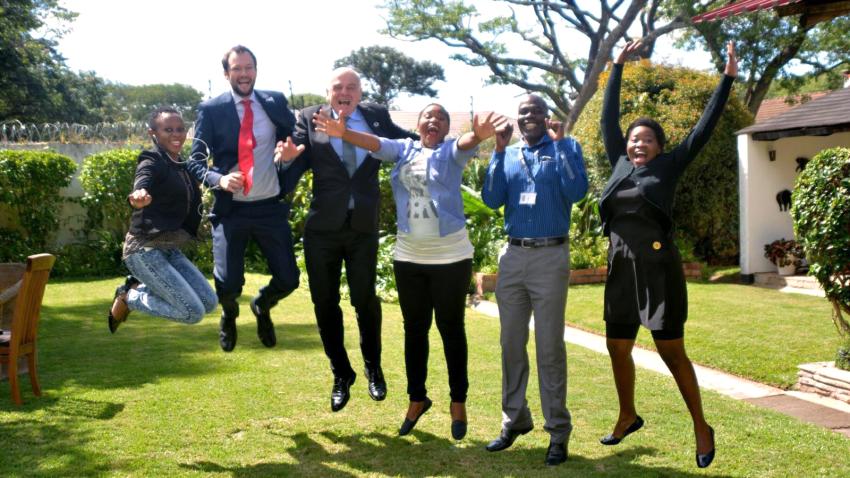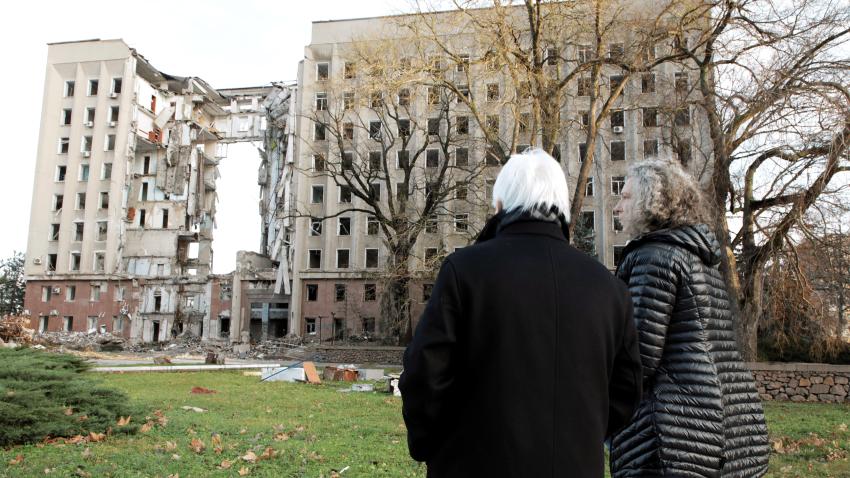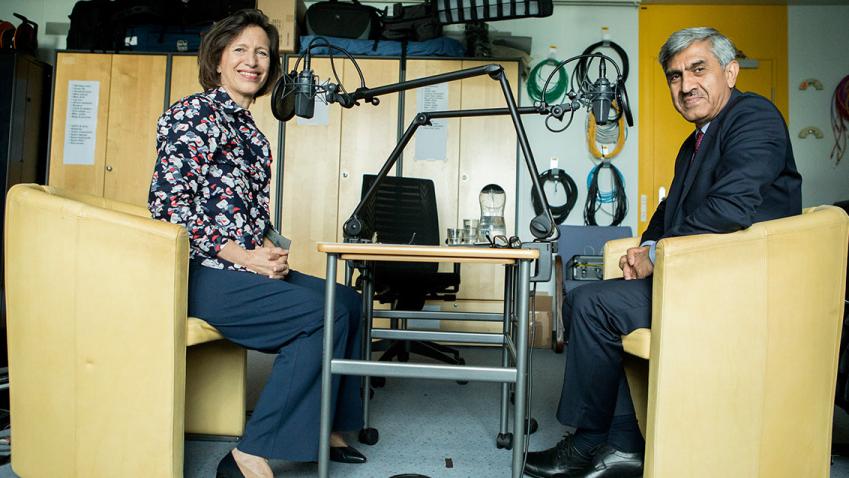“[There are] two iconic images of the 20th century: Diana walking through the minefield in body armour and then with a little girl who lost a leg to a mine. I was proud to...highlight the incredible work that's been done by deminers around the world by hosting that visit.”
Paul Heslop is the Head of the UN Mine Action Team in Afghanistan and has been clearing mines in conflict zones for nearly thirty years. He shares the remarkable progress deminers have made in removing explosive devices across the globe with Mozambique (his first post back in ‘94) declaring itself mine-free two years ago. Paul also recounts his time as a field officer for the Halo Trust when Princess Diana came to visit a minefield in Angola where he was working back in 1997. He recalls that epochal moment and how his quick thinking led to the non-profit gaining huge worldwide exposure through the iconic photographs of the trip.
For additional reading, see this brief visual history of the United Nations in mine action from the UN Mine Action Service (UNMAS): "Together for mine action; a multilateral success story"
Full Transcript +
Melissa Fleming 00:00
From the United Nations. I'm Melissa Fleming, and this is Awake At Night. Joining me today is Paul Heslop, the Head of the UN Mine Action Team in Afghanistan. Paul, you work in the field of mine clearance, which sounds like one of the most dangerous jobs in the world, tell me about it.
Paul Heslop 00:40x
It's actually nowhere near as dangerous as people think and we've actually had more people recently killed in road accidents driving to and from the minefield to work than actually when they're on the ground. Because, when they're in the minefield, they're working in a very disciplined environment. We work to international mining standards. We have very high levels of supervision and quality control in place. Unfortunately, in the countries we're working in, the roads are awful. They're often driving in high powered vehicles and so unfortunately, statistically, you're more likely to be killed or injured driving to and from the minefield than when you're actually working in the minefield.
Melissa Fleming 01:15
Interesting. Can you just paint a picture of the situation globally? How bad is it? Are land mines all over the place in war zones or places where wars happen?
Paul Heslop 01:29
Actually, I mean, I've been doing this for nearly thirty years and in a sense, the war against mines or the mines that were in play from the colonial independence wars and legacy Cold War conflict, the vast majority of those mines have now been cleared. So in countries like Mozambique, when I started working there in 1994, they were saying it was going to be fifty years to clear it. Mozambique declared itself mine free two years ago. Countries like Angola and Nepal, huge, huge progress has been made around the world. And in Afghanistan, where I work at the moment, more than 95% of the casualties today are from mines or explosive devices that have been employed since 9/11, since 2001.
That's a pattern replicated across the world so the countries that have a growing problem; Afghanistan, Syria, Iraq, Yemen, Mali, Somalia, and most of the countries that, you know, were high on the agenda in the 90s, places like Cambodia, Vietnam, Laos, Mozambique, you're seeing massive reductions in casualties and some of these countries are actually now declaring themselves mine free.
Melissa Fleming 02:36
And that's thanks to your organisation?
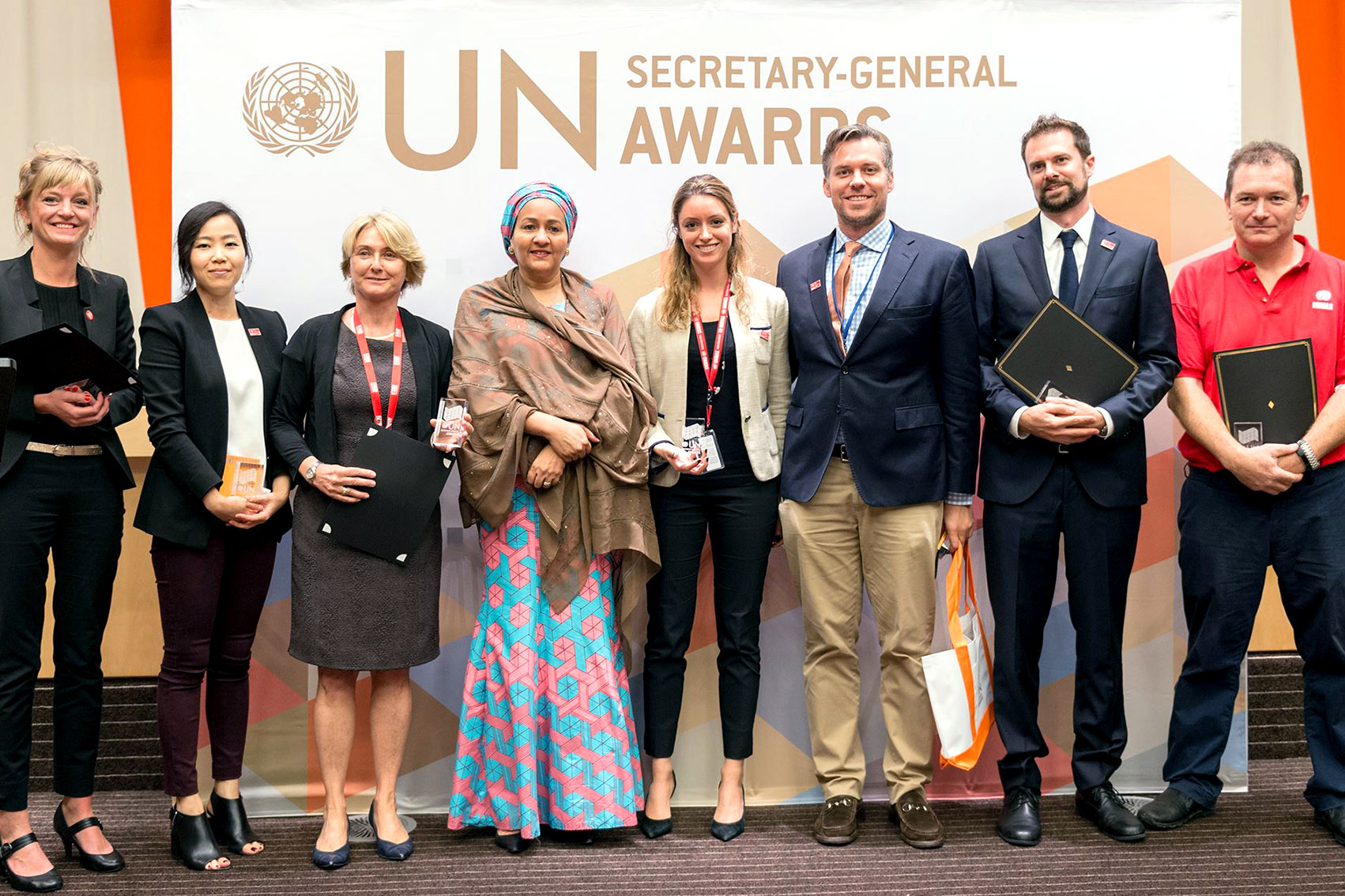
Paul Heslop 02:38
And that's thanks to the international community that came together and signed the Ottawa Treaty, which was the Ban The Mine Treaty which was signed in ‘97 which banned the use and production of mines and has now been ratified by over 163 countries. And really just a dedicated effort from the unsung heroes of the sector which are the Mozambican, the Angolan, the Afghan deminers who will go out in the morning at six o'clock, spend eight hours on their hands and knees, swinging the metal detector, excavating in the ground and making their community safe. They've cleared literally millions of mines in the last 25 years.
Melissa Fleming 03:13
Amazing. It just doesn't seem like a kind of obvious career choice. Who would decide to become a mine clearer?
Paul Heslop 03:24
I think somebody who enjoys life and wants to try and make a difference. I was British military. I had an accident playing rugby. I snapped my knee and that sort of medically downgraded me. And while I was going through a sort of an appeals process for the medical, I bumped into a friend who was working for a British NGO called The Halo Trust who specialised in clearing minds. And he said, ‘Oh, we're looking for some people for Mozambique, would you be interested?’ Two weeks later, I arrived in Maputo, and I've been clearing mines ever since.
Melissa Fleming 03:58
You know, you just kind of fell into this work of mine clearing?
Paul Heslop 04:04
I do it because I think it is incredibly challenging. And very early on when I was... one of my instructors who was teaching me how to do EOD, Explosive Ordnance Disposal, says, you know, one thing you're like with this is every day's a school day. And he's right. Every single day that I've been doing this job, I've learned something, you know. And so in terms of that personal and professional development, I've been working sort of on Maslow’s highest motivation, in terms of Maslow’s needs, for my entire career. Because everything I do makes a difference in a positive way. I don't get up in the morning and look in the mirror and have doubts about what I'm doing. And to be able to say that after thirty years is fantastic.
Melissa Fleming 04:41
Most people can't say that about their career choice, that's for sure. Just when you say that, that it's a constant learning, can you just give me an example of what you continue to learn? It sounds to me like, you know, there's a mine; clear it.
Paul Heslop 04:55
I mean, this is one of the challenges that we face is that the world has evolved. In late ‘80s, early ‘90s, you know, it's the end of the Cold War, the Berlin Wall came down, so our ability to operate in these countries was completely different and the challenges were completely different. But then again, there was a sea change in 2001. I was actually based in New York when 9/11 happened. I was running the Halo office here, the liaison office to the UN. And as soon as I saw those planes hit those buildings, and I was still on the roof of my apartment blocks watching them burn, I realised that the world had changed. And I was on the phone to our headquarters in Scotland, saying that we needed to get our team out of Afghanistan, because it was going to go wrong. We got the guys out on an ICRC flight two days later, and the bombing pretty much died.
And you know, the world changed on that day. And so since then, the way that asymmetric groups operate, the way that the UN has become a target, the way the aid agencies are looked at, it's all very different. You know, when I first deployed into Africa, wearing a white t-shirt with a logo, and a white car with a logo on the side of it, gave you protection, now it makes you a target. And, you know, the use of particular IEDs and explosive hazards have been directed at UN and particularly UN peacekeepers. Over the last five years, pretty much most of my efforts, while I've been in New York, have been on supporting peacekeeping operations in places like Somalia and Mali where the peacekeepers have been targeted by insurgent groups using IEDs to try and disrupt that their operations, to kill peacekeepers, and to disrupt the mandate that's being given by the Security Council.
Melissa Fleming 06:34
So the nature of conflict has changed...
Paul Heslop 06:36
The nature of conflict has changed, the threat profile we're dealing with so we've got to figure out how can we change the behaviour so that these different specific groups are able to be protected against the threat that's against them. When I was working in Africa, in the ‘90s, a lot of the casualties were women and young girls who were going into the bush to collect firewood, to collect water or to try and, you know, gather fruit or things, foraging if you want. Today, a lot of the casualties that we see our young teenage boys going to collect metal scrap or tampering with explosive devices for the fun of it.
You know, that's a gender dimension. And we've got to look at how we can change the behaviour of teenage boys. Well, who do those boys listen to? Who do they respect? Well, they probably really respect their mother and their grandmother. So if we can target a group of education to them so that they can then explain to their children, their teenage boys, why this is not a good idea, and why this is dangerous, you know, we are able to influence that behaviour, and change it so that they are not casualties, their mothers and grandmothers feel happy that they do something to protect their children.
Melissa Fleming 07:43
So it's a combination really, of clearing, and educating the population depending on who is most at risk.
Paul Heslop 07:52
All of the other factors. I mean, for me, actually being at the end of the lane, swinging the detector and cutting the red wire or the blue wire, that is actually pretty straightforward. It's getting the right people in the right place at the right time with the right equipment, the right training and the right motivation, the right logistics, the right support, to be able to do that day after day safely. And know if something goes wrong, everything's in place to keep them alive and to give them the best chance of surviving. That's the challenge and that's why my job is so amazing.
Melissa Fleming 08:24
Let's go back to your early days when you were in Mozambique, and you were a field officer in Halo. It was 1994 when you started and three years later, you had a very famous meeting with Diana, the Princess of Wales, when she visited a minefield in Angola in 1997. Can you describe how you prepared for that? And then what happened?
Paul Heslop 08:50
Very carefully. I didn't want to be responsible for blowing up the most famous woman in the world. It was a really interesting time in terms that, at that stage, what became the Ottawa Treaty and what was the Ban The Mine Treaty was still very much a campaign that was being organised by civil society. There wasn't really a huge amount of buy-in from that many governments. There was a lot of lobbying going on. And the British Red Cross had a relationship with Diana and the International Committee for the Red Cross were big proponents of this Treaty.
So the Red Cross had reached out to Diana to come out and visit, you know, a mine affected country. And they decided that Angola was the one that had just come out of conflict and was probably the safest to go to, for whatever reasons it was selected. The town that I was working in had been under siege for 22 months. I was sat one night and I was counting bullet holes in a lamppost and there were 190 bullet holes in one lamppost. So yeah, the town was just shot to pieces.
My first six months we were there, we cleared over 6,000 items. There was somewhere between 20 and 30 mine accidents a month. It was as affected a place as anywhere in the world. And so to bring Diana in was going to give great visuals, which it did. We prepared for a visit. She went to a real minefield. We showed her a real mine that had been cleared, and then she blew it up. The only hiccup on that was when we did the dry run in the morning, the exploder that she had to press wasn't working. So we had somebody sat behind the car with a car battery and why we counted down three to one wasn't so that the press could take the picture of the bang, it was so he knew when to put the wires onto the car battery.
But that was the only hiccup on the visit. We had a really interesting day, she was very nervous to start with and I'm not surprised. I mean, the first time I went into a minefield, I was pretty, pretty nervous, shall we say. And I didn't have 100 journalists with me being beamed around the world. And then she went to a Red Cross orthopaedic centre, she had the picture with the amputee girl who was being fitted for a leg. And I think, you know, those were two iconic images of the 20th century, you know. Diana walking through the minefield in body armour and then with a little girl who lost a leg to a mine. And you know, when you see the montage of images of the 20th century, those are two that come up again and again. So I was very proud to be involved in highlighting the incredible work that's been done by deminers around the world by hosting that visit.
Melissa Fleming 11:38
I guess you really seized the opportunity and it was, and it is, an area that probably has gotten far too little attention. I understand that she also wore the logo of your organisation, how did you manage that?
Paul Heslop 11:51
That was actually a bit of a funny one was that… The night before, I thought we've got to get the logo onto the body armour because before that none of the body armour had it. And I went and got a car sticker out of the storeroom and it kept peeling off. And so I ended up taking a pillowcase from my bed and tracing it with a blue felt pen, the logo, and then getting the maid to sew it on. So if you did look closely at it, the three logos aren't quite the same because my template skills aren't that good. And they were sewn on literally the morning of the visit. But in terms of getting the brand out there and raising the profile, it worked pretty well.
Melissa Fleming 12:34
I can imagine.
Paul Heslop 12:35
I've always said I wish I got a tenner every time that picture had been used.
Melissa Fleming 12:38
You mentioned Princess Diana visited a young woman who had lost her leg after stepping on a landmine. And can you remember a story yourself that just really affected you of meeting somebody who lost a limb?
Paul Heslop 12:55
I think the one that still lives with me was from Angola where, I think it was a Saturday or Sunday afternoon, we were sat in the garden. We heard a bang a few 100 metres away and one of my colleagues and I, because all of our vehicles were equipped to be ambulances, we ran out to the vehicle and drove to where we saw the bang. We could see the smoke. We drove over. And there was a little stream running through a few houses. And there's a little girl laid at the side of the stream and she'd fallen over and she's obviously detonated the mine.
Her family were obviously very distressed, but nobody wanted to go forward because they were obviously afraid. And my colleague and I jumped into the river and walked up the river because we hoped there weren't any mines in it with the stretcher, grabbed her, put her on the stretcher, ran to the car, and then drove to the... there was an MSF hospital with a surgeon a couple of miles away. We drove there.
We were all so pumped up with adrenaline we didn't... I don't think we'd really realised what was happening. And when we got to the hospital, we pulled the stretcher out and the little girl as she came off, as she was coming out of the stretcher, rolled back and not only had she lost a leg but when she'd fallen she'd landed on another mine with her head and had blown half her face away. And so she was dead. But that was a pretty, pretty unpleasant experience.
Melissa Fleming 14:13
I guess that's probably a sight that it's hard to get out of your mind.
Paul Heslop 14:16
Well, it’s still living with me 26 years later. But there's been a few... But I've also had a deminer who has stepped on a mine and I remember holding his hand all the way to the hospital. And then I was in the room with him when he had his leg taken off.
Melissa Fleming 14:33
What was that like?
Paul Heslop 14:35
Pretty unpleasant. But we...I mean, MSF had an amazing team of surgeons but they were short staffed so often my team and I would help out either in the operating theatre or on the evacuation. So in Angola, in the late ‘90s, in ‘94, it was pretty full on.
Melissa Fleming 14:54
And yet you say these deminers themselves are generally safe. It's very rare that they actually get affected?
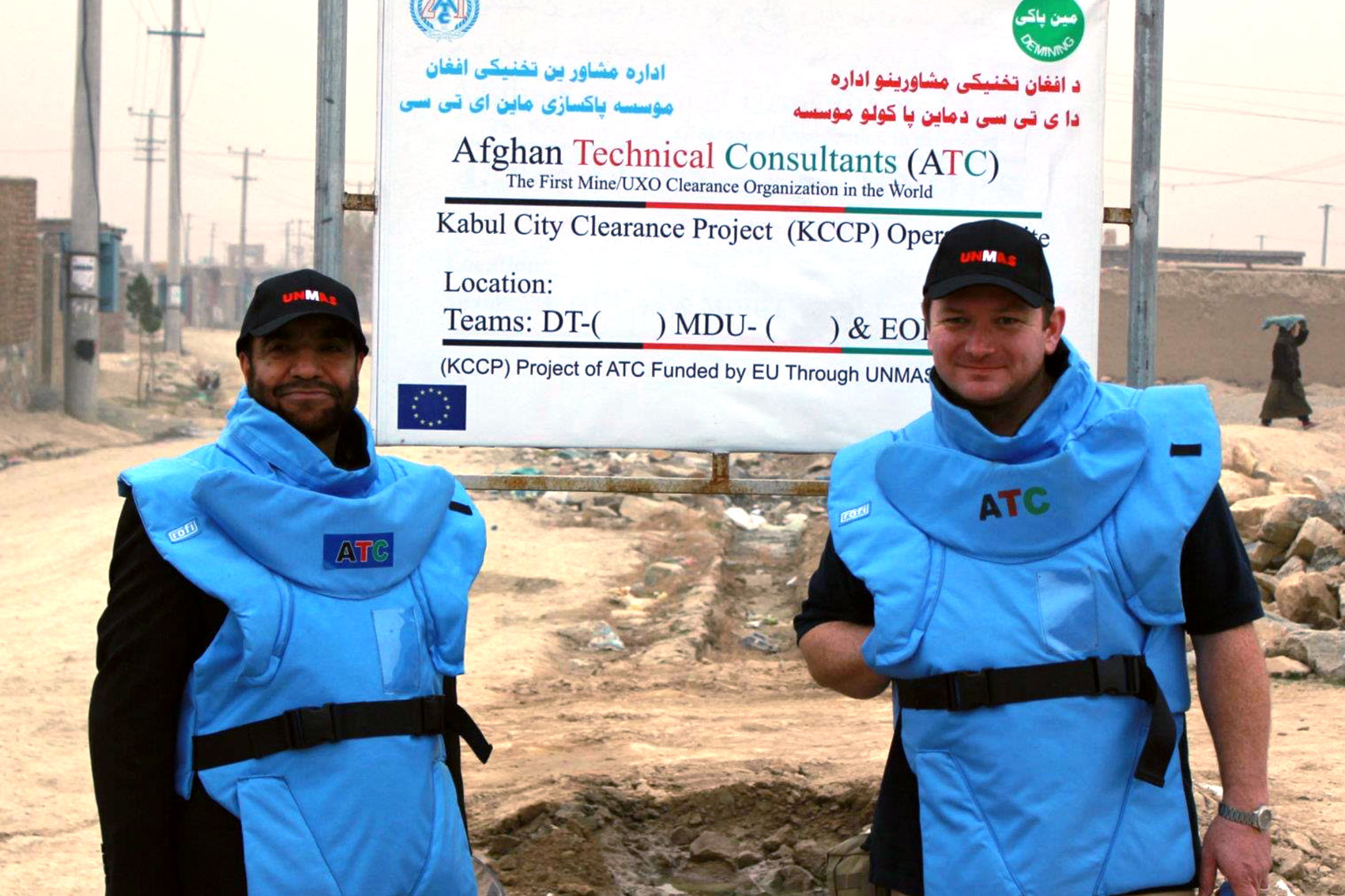
Paul Heslop 15:01
The casualty rates have come down. I mean, it used to be a lot more dangerous but I mean when I first deployed our protective equipment was a pair of ballistic sunglasses. We didn't have any body armour. We had a detector that was pretty basic and a prodder and a little scraper and that was it. Now we wear kevlar body armour. We've got visors. We drive around in mine protected vehicles, ground penetrating radar, the technology and the level of protection has increased dramatically. But still ultimately, at the end of the day, the most effective tool for demining is a man with the right equipment and the right training.
And human beings make mistakes. It used to be roughly for about every 400 mines being cleared, 500 mines cleared, somebody would have an accident, that number is now more like 2,500. And the consequences of the accident are usually significantly less because they're wearing better equipment and better tools. But human beings make mistakes. And when you're working with explosives, it's very unforgiving.
Melissa Fleming 16:04
Tell me, what is the profile of somebody who would choose to do this job, other than you've mentioned your motivation and how this inspires you, but somebody who goes and the likelihood is that high that they could get injured?
Paul Heslop 16:20
Again, as a percentage of the people clearing mines around the world, very few of them are internationals. The problem is being addressed by the deminers from their own country. You know, it's Angolan, the miners in Angola. It's Cambodian deminers in Cambodia, Afghans in Afghanistan, Iraqis in Iraq, so, you know, the real heroes are those guys. I'm sure that there is a lot of motivation. I know a lot of the African deminers are very proud to be deminers.
I mean, funnily enough, you know, the Taliban in ‘97 declared a fatwa on mines and said that any Afghan who dies clearing a mine is a martyr so there is a huge amount of respect in the communities for these guys, and now a few ladies. In reality, they get a dollar salary and this is one of the other things that, you know, I think in, in Afghanistan, you know, when we had 18,000 Afghans deployed each day, what was the impact of 18,000 men of fighting age, taking home a salary, not picking up an AK, making their community safer and working with a goal, being given direction and in an Afghan society, they're probably supporting 10 to 20 family members. How many deminer salaries have paid for their kids to be educated, for their grandparents to have medical treatments? You know, the impact of what we do is so much more than just clearing a mind from the ground.
Melissa Fleming 17:43
Wow, I can see why you're sticking with this profession. What does your wife think about what you do?
Paul Heslop 17:50
Well, I met my wife in Angola. She was working for an NGO. She's now an investment banker and thinks I'm nuts.
Melissa Fleming 17:58
She's an investment banker here in New York?
Paul Heslop 18:01
Here in New York. She was a bright mathematician, qualified as an accountant, and felt that she should put something back into the world before she went into banking. So she volunteered to be… She was a volunteer with Concern for two years in Angola, which is where I met her. And then when we started seeing each other a few years later, she was working for Morgan Stanley in London as a successful investment banker, and I was still running around the world clearing mines. And then we got married, had kids, I was able to get a post here in New York, and she was able to transfer.
Melissa Fleming 18:30
And you have how many children?
Paul Heslop 18:32
I have twin boys.
Melissa Fleming 18:33
You have twin boys, and how old are they now?
Paul Heslop 18:35
They’re 14.
Melissa Fleming 18:37
Okay, so what do they tell their friends, like, what does your dad do?
Paul Heslop 18:42
Yeah, I'm not sure. I've been to that school and I've presented to the school and answered questions. Kids are great, actually because they're not afraid to ask questions. I love going to schools and talking to kids, because they're always so so engaged,
Melissa Fleming 18:54
But you decided to leave New York and go to Afghanistan, why?
Paul Heslop 18:59
Yeah, the hardest part was leaving the boys but it's only for a year. And I've been here a long time. And I felt I'd sort of lost my connection with the field, although I have visited all the programmes many, many times. And the chance to go back onto the ground into a programme like Afghanistan which is at a really dynamic point. You know, the peace process is at an interesting stage; the potential of ‘Will the Americans pull out? Will NATO pull out?’ The casualty rate has gone from 200 ten years ago to nearly 2,000 now. The threat has evolved. There are funding challenges. The real threat now comes from mines of an improvised nature so victim operated IEDs. There is a need to upskill the Afghan deminers and provide them with new equipment, new training.
Melissa Fleming 19:46
Tell me about now. I mean, you mentioned the thousands of men who were employed and what benefit that had in Afghanistan to clear the mines of the ‘70s and the ‘80s. And now we're in this current very different situation and you have mines but you also have you even said something like victim IEDs?
Paul Heslop 20:08
IEDs, improvised explosive devices so these are victim operated.
Melissa Fleming 20:12
Victim operated?
Paul Heslop 20:13
So it means the person who triggers the device is the one who's injured by it. So if I was using the…
Melissa Fleming 20:19
So it’s a suicide bomb?
Paul Heslop 20:22
Well, no, it's an involuntary suicide bomb. You know, so they walk along and they catch tripwire or they step on a pressure switch or, in the case of Iraq, you know, maybe they go back to their home and a light switch or a fridge has been rigged up and they open the fridge door and it goes bang or a light switch so…They’re what used to be called booby traps. Because there are issues about how this falls under the Ottawa treaty, in Afghanistan, they very much wanted these to be classed as mines.
So in Afghanistan, we call them mines of an improvised nature, or improvised mines. And then because of the nature of the conflict, we cannot clear because we're neutral and the humanitarian organisation, we can not clear devices that are in play. So if they've been deployed to try and target a NATO convoy, or troop movement or the Afghan police, we can't clear them because that would make us combatants. We can only clear abandoned improvised mines. But the abandoned improvised mines, or the improvised mines are what are causing a lot of casualties today in Afghanistan.
And because they're, I mean, being made in their thousands. But every one is slightly different. So the deminers have to have a higher level of skill, they have to have a higher level of knowledge, generally better equipment, and they're looking in some cases for things that are very, very small metal signatures, so these detectors become very expensive.
Melissa Fleming 21:42
How do you know where to look?
Paul Heslop 21:45
I mean, a lot of it is about gathering data and talking to the population. Traditionally, we would try and find the commanders who'd been involved in, and whether even if they'd laid it out, but a lot of it is about sort of, you know, in the military terminology, intelligence gathering, and unfortunately, quite often the first indicator of the presence of a device is somebody has set one off. And very rarely, there's one on its own. So often, the first indicator that there is a problem is a bang and pink mist.
Melissa Fleming 21:15
Is there a story, a recent story, that during your time there in Afghanistan that’s just really struck you as an example of this phenomenon?
Paul Heslop 22:25
I think the traditional anti personnel mine is a manufactured device that would normally have between 50 and 300 grams of explosives in it, and it's designed to normally take a soldier's leg off below the knee. Because when a soldier is injured, he needs two men to carry him out. And then there's a medical chain behind him. So my victim in traditional conflict becomes a logistics problem for the attacking army.
In the asymmetric type of environment we've got in Afghanistan, they have opted for using homemade explosives which requires a larger amount in terms of weight. And they're the default option seems to have been to come back and use a palm oil container which is normally between 15 and 20 litres. So this thing is about 15 to 25 kilos of homemade high explosives. Well, 15 kilos of high explosives does completely different things to the human body to 300 grams.
But often these devices are also employed, so they can take out vehicles. And this is where the worst stories are in Afghanistan because you'll have these pickup trucks and might have 20 people in the back and 25 kilos of explosives going off under a soft skin pickup truck which has 20 people in it just spreads people all over the countryside. And unfortunately, and that's another thing that we're seeing in Afghanistan is that, the number of casualties per incident is going up. And the injuries are horrific. And there's a lot more fatalities as a result. So...
Melissa Fleming 24:00
So these are more terrorist acts?
Paul Heslop 24:02
Yeah, they're even more of a terror weapon than, if you want, the original mines were.
Melissa Fleming 24:07
Have you felt gratified one day, you know, since you've been there, because you or one of your team were able to identify and to prevent some horrific explosion from happening?
Paul Heslop 24:20
In a sense, I get that every day. Because, you know, I know what we're doing is making a difference. In Afghanistan, we basically have a plan, we have a model that will take Afghanistan to being mine free. Obviously, that's not going to... that can't deal with what's been employed now but what we know is in the ground, and if we had the resources, we could do it in five years. When I arrived in Afghanistan in ‘97, if you think 99% of the casualties that were being caused in ‘97, those mines no longer exist. They were cleared, they've gone. And they've not come back. There is a different problem from a different conflict, different contamination. That's a problem in Afghanistan. The legacy contamination from the ‘80s and ‘90s has pretty much been dealt with.
Melissa Fleming 25:07
Paul, tell me, you know, the title of this podcast is what keeps you awake at night, and I can imagine you have a lot that potentially could wake you up in the middle of the night. Tell me what that is?
Paul Heslop 25:20
I think probably the thing that I would say is the most likely to keep me awake at night is that we lose the momentum of what we've achieved in the last 25 years. This is a success story. But there is a level of donor fatigue. There is a sort of feeling of ‘Oh, it's never gonna be over.’ And it's not true. It’s that the problem has changed. So yeah, I would say, what keeps me awake at night is the thought that we are not communicating the success and we're not able to engage the support we need, because people have run out of patience with a problem that has actually is well on the way to being solved.
Melissa Fleming 25:56
Well, you're doing quite well communicating the benefits of clearing minds and IUDs. So tell me, just a few more questions for you, you had a few years ago, a very bad skiing accident, I believe. How did that happen? What happened? And how did that affect you?
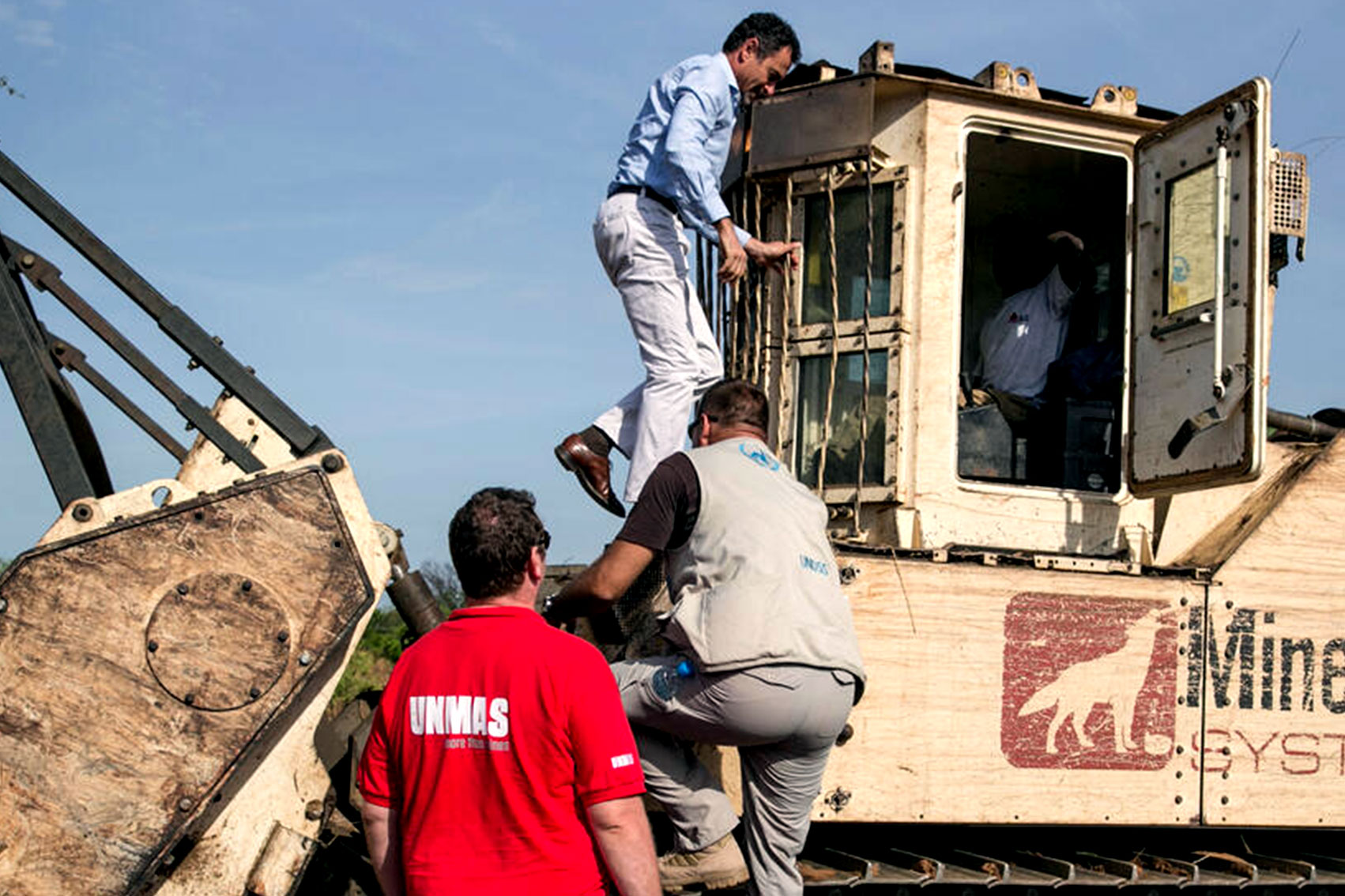
Paul Heslop 26:18
That was quite a surreal experience. Twenty years of bomb disposal and not a scratch and I was skiing on...well, it wasn't a learner slope but on a relatively easy mountain in the Catskills. It was an icy afternoon, I caught an edge. I went spinning, and I got faster and faster and faster. And I went off the edge of the slope, travelling at about 50 or 60 miles an hour, and was stopped by a snow machine with no padding. So I wrapped myself around the metal pole at about 50 to 60 miles an hour, shattered my arm, punctured my lungs, and tore my aorta. But fortunately, the tear held and I only lost eight pints of blood.
Melissa Fleming 27:04
You were lucky, I guess.
Paul Heslop 27:06
I was evacuated by helicopter and four people made decisions that saved my life. And a vascular surgeon put a stent into me, into my aorta, saved my life with about 15 minutes to spare. And I spent a couple weeks in intensive care.
Melissa Fleming 27:21
Has that changed your outlook anyway?
Paul Heslop 27:24
Well, it's interesting because my arm is paralysed now. I am a person with disabilities as in physical disabilities, I also have dyslexia. So having a, if you want, learning disorder has always been quite an interesting thing to deal with, but now having a physical disability as well. I think it's one of those things that you just, you get on with it. I mean, but for me, I would say it's highlighted how lucky I am. How incredibly lucky I am in life.
You know, I have an amazing job. I work with amazing people. I get to do amazing things. And I'm lucky enough that I'm educated enough and I've had the opportunities that having a life changing injury didn't really change my life the way it could have. And when I see, you know, people who've lost their legs, lost their arms in the countries that I've worked in and travelled to, you know, I just have nothing but respect for how they get on with their lives with disabilities that are far worse than mine.
I was in a taxi one day with my boys. And there was a, obviously, I would think he was a veteran who had lost both his legs and both his arms. And he was getting himself around. And I said, you know, ‘Boys, look at that, man, if he can get on with his life, you know, and have the bravery to continue his life with those conditions. I've got no problem with mine. And you've got no problems in your life.’
So you know, I think having something that changes your physicality, your ability to move, to operate, yes, it changes your perspective. But I would also say I didn't realise I was dyslexic until I was in my thirties. And I was doing my masters. And suddenly, you know, a couple of things didn't add up. And so he said, ‘Well, why don't you go and get tested.’ And suddenly, I got tested, found out I was dyslexic. And, and the light came on. ‘Oh, that's why you can't do this.’ I can talk to you now absolutely articulate. You put me on the stage with a script in front of me. And I will completely ‘blah, blah, blah.’
But if I talk from the heart or I talk from prompts, I can talk from prompts or I can talk from pictures. But if you give me a script, I can't read out loud. I would be absolutely petrified if I was sat talking to you now. Because that's the way my dyslexia works. I can't take... I can read a book, but I can't take it into it and push it out at the same time. And the arms a bit like that, you know, when I get in and out of a vehicle, particularly an armoured vehicle, I have to think about what I'm doing. If I'm wearing body armour, I have to think about how I'm going to move with it. You know, you just have to start thinking ahead to how will I deal with this situation when my arm isn't working the way it should do? But compared to the thousands of people I've seen who've lost limbs are much worse. I'm very lucky.
Melissa Fleming 30:02
Yeah, dyslexia seems to be something that is not diagnosed with everyone early enough and it can have a huge effect on children, not understanding why they're different than others in their learning.
Paul Heslop 30:18
I was told I was stupid and lazy all the way through high school ‘cause I was as bright as anybody in the class, but I didn't get the results that was expected. I got into three top business schools. I went to one of the best business schools in the world to do my MBA and in class I was holding my own. And, you know, in some of the exercises, I wasn't, and it just wasn't making the connection. But at that stage, you know, somebody said, ‘You might be dyslexic, why don't you go get tested?’ You know, if that had happened when I was 11 years old? Well, I don't think I'd be any different. You have life abilities, I can't complain.
Melissa Fleming 30:53
If people were saying that you were stupid. How did you have the self confidence to keep going on?
Paul Heslop 31:01
I think growing up in the ‘70s and ‘80s was a little bit different to the political correctness of today. You know, I was in the northeast of England in a very working class environment, and you go along with it. Yeah. Being told I was stupid was a lot less bad than getting smacked on the head. Schools were very different and education was very different. But, you know, I've had my sons tested. They're both dyslexic, and we identified it. It's genetic.
My mother is. She's never been tested but I can tell from reading her emails! My sons…we’ve known from a very early age, they were dyslexic. And, you know, the accommodation is made in classroom, they're not told they're stupid. They're not told. It's education. And that's why education is so important. Because people you don't know what you don't know.
Melissa Fleming 31:47
What do you do to relax these days?
Paul Heslop 31:51
Spend too much time playing computer games. I like food.
Melissa Fleming 31:55
I hope they’re not war games!
Paul Heslop 31:57
I like food. I like cooking. Both my parents are chefs, I really enjoy food, and cooking. I enjoy reading a book, I enjoy watching a good movie, I love catching up with friends and just socialising. Although, at the moment, that's not quite as possible as it would normally be.
Melissa Fleming 32:13
I can imagine when you're in Afghanistan, I mean, I've been myself in those compounds it's quite restrictive. And with COVID How is it for the staff working there?
Paul Heslop 32:22
It's what you make of it and I mean, ultimately, everybody in the compound, you know, we go in, we quarantine, we have a test. So you know, it's as safe as it is. But, you know, I find that in the field environments, people make more effort. I made sure I took some things with me that, you know, make life a little bit different. I enjoy cooking. So, for example, I've taken a little ice cream machine, so I went to a event with UN women and I turned up with a bowl of grapefruit sorbet which was a bit of a hit
You know, you can do things that make your life a little bit more comfortable. Living in the field doesn't… Just because you're in a container or a compound doesn't mean that life is miserable. My first six months in the field the tents didn't clear customs so I slept in the back of a Land Rover for six months. And my colleague was under the UNHCR plastic sheet and we were the internationals you know, so you can imagine what the deminers were sleeping under!
So being in a hardwall accommodation with running water and electricity is luxury.I mean, okay, I'm 50 now so I don't quite want to be doing it but it's, you know, being in a tent but…There's always somebody worse off than you are and you make of it what you can. To me, I'm really enjoying being back in the field. I'm enjoying that social aspect, I'm enjoying, you know, hearing the stories of you know, what's going on in OCHA, what's happening with WFP, you know, the different people so, for me, I'm really enjoying the opportunity to reconnect.
Melissa Fleming 33:52
Paul, it's been really a pleasure talking to you for Awake At Night. Thanks so much for joining us.
Paul Heslop 33:57
Thank you.
Melissa Fleming 34:05
Thank you for listening to Awake At Night. We'll be back soon with more incredible and inspiring stories from people working to do some good in this world at a time of global crisis. To find out more about the series and the extraordinary people featured, do visit un.org/awake-at-night. On Twitter, we're @UN and I'm @melissafleming. Subscribe to Awake At Night wherever you get your podcasts and please take the time to review us. It does make a difference.
Thanks to my producers Bethany Bell, and the team at Chalk & Blade: Laura Sheeter, Cheri Percy, Fatuma Khaireh, and Alex Portfelix, and to my colleagues here at the UN; Roberta Politi, Darrin Farrant, Geneva Damayanti, Hilary He, Tulin Battikhi, Bissera Kostova and the team at the UN studio.
Special thanks to the UN Office for Coordination of Humanitarian Affairs for their support. The original music for this podcast was written and performed by Nadine Shah, and produced by Ben Hillier. The sound design and additional music was by Pascal Wyse.

